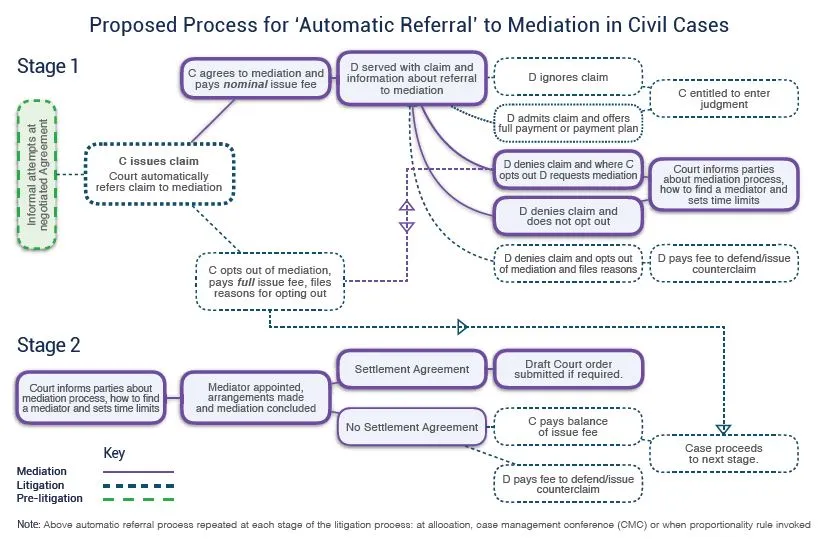At the CMC Workplace Mediation event in Solihull held in October, the majority of speakers and participants expressed their profound disappointment at the continued low level of take-up of mediation in workplace and employment disputes. Singularly frustrating is the trend to invoke grievance procedures and head for the employment tribunal instead of engaging in a more constructive dialogue.
This trend is certainly not confined to the workplace and employment arenas. The CJC Report1 published in October acknowledged that the light touch approach to encouraging mediation over the past 25 years had not delivered an appropriate shift in culture and the CJC ADR Working Group has launched a consultation process to explore the possibilities of some form of compulsion to mediate in the civil justice system.
There are echoes of the observations in the 2007 National Audit Office2 report which identified that more needed to be done to promote mediation and ‘financial disincentives’3 removed in the case of solicitors. Arguably, more stick than carrot has been noted in recent judgments regarding costs sanctions for refusal to mediate in the Commercial Courts and this heralds an important influence on the culture of dispute management.
CMC has prepared a response to the CJC Consultation, and an outline proposal for ‘Automatic Referral to Mediation’’ has been drafted by Paul Randolph on behalf of the CMC board. This was presented at CMC’s AGM on 29 November 2017. It is expected that a greater number of cases could be ‘automatically referred’ to mediation and the process would become an integrated part of the litigation process which is a particular aspiration expressed in the CJC ADR Working Group report and Lord Justice Briggs’s Civil Courts Structure Review4 published in July 2016.
4.9. Mediation can be regarded as the pre-eminent non-adjudicative dispute resolution process conducted in parallel with litigation. Almost all decided cases about ADR have actually been about mediation. It is common for cases to be stayed for mediation on the route to trial.5
The board invited comment from the membership, principally whether in support of the proposal or not, and will submit its response in time for the deadline on 15 December 2017. The flowchart6 and accompanying notes7 are available on CMC’s website.

1https://www.judiciary.gov.uk/wp-content/uploads/2017/10/interimreport-future-role-of-adr-in-civil-justice-20171017.pdf
2https://www.parliament.uk/documents/public-accounts-commission/tpacnaoannualreport07.pdf
3Ibid. p.18 Listening to Consumers Views para 3
4https://www.judiciary.gov.uk/wp-content/uploads/2016/07/civil-courtsstructure-review-final-report-jul-16-final-1.pdf
5https://www.judiciary.gov.uk/wp-content/uploads/2017/10/interimreport-future-role-of-adr-in-civil-justice-20171017.pdf p.16
6http://civilmediation.org/library-get?id=19
7http://civilmediation.org/library-get?id=18
Lorem ipsum dolor sit amet, consectetur adipiscing elit, sed do eiusmod tempor incididunt ut labore et dolore magna aliqua. Ut enim ad minim veniam, quis nostrud exercitation ullamco laboris nisi ut aliquip ex ea commodo consequat. Duis aute irure dolor in reprehenderit in voluptate velit esse cillum dolore eu fugiat nulla pariatur.
Block quote
Ordered list
Unordered list
Bold text
Emphasis
Superscript
Subscript